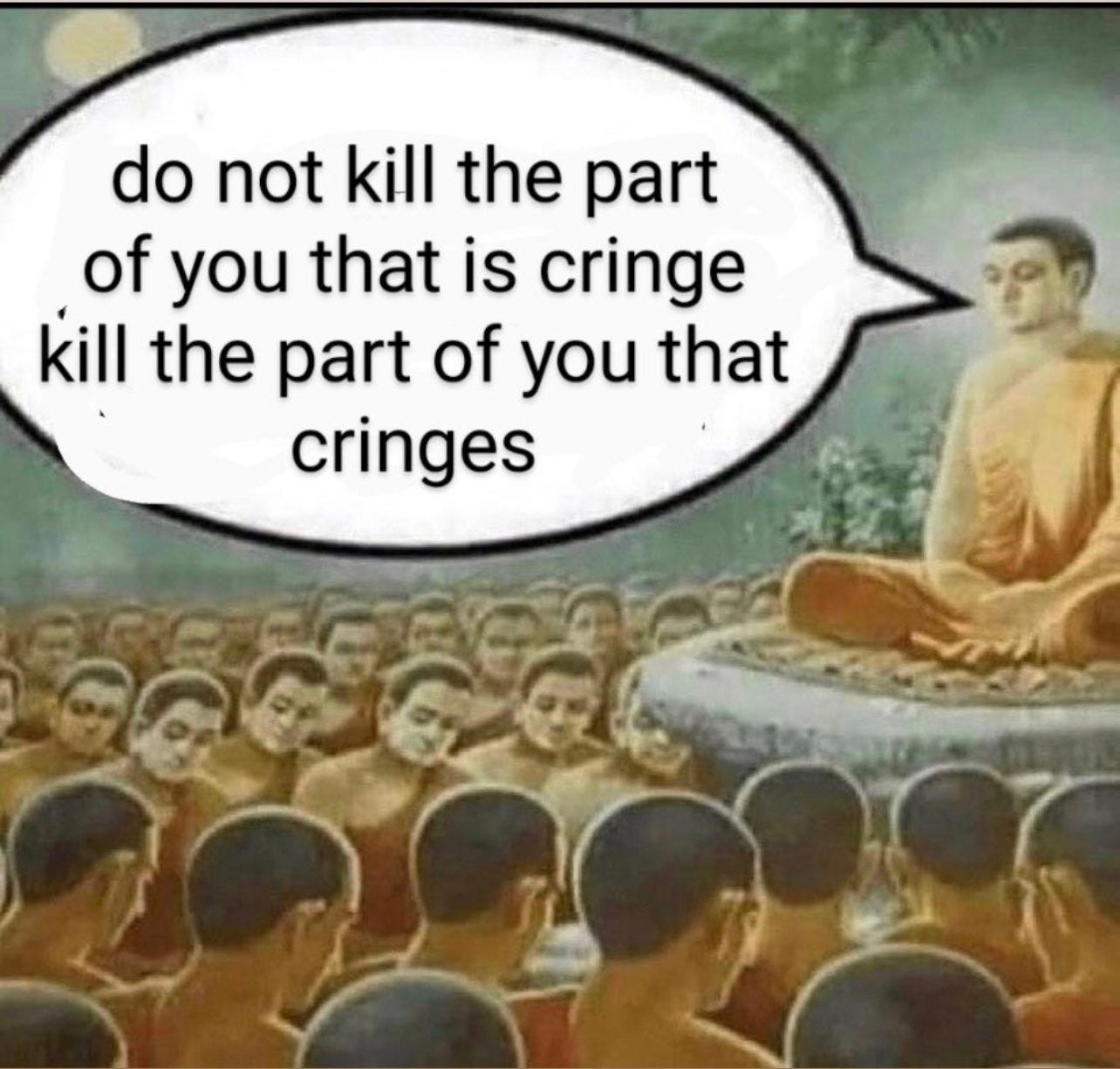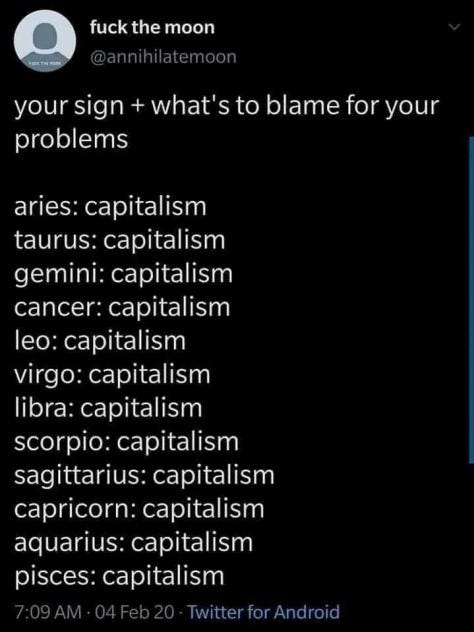Meditating to Explore the Phrase, "Fuck it."
"Why bother?" and "Why not?" are only an alchemical reframe apart.
They say not to get your life advice from memes. But this one, posted to the Creekmasons Discord, actually acts as a Trojan Horse to a nugget of wisdom. In January, I completed a round of the meditation challenge David Nichtern proposed to Duncan Trussell. Among other things, it clarified the reality that emotions I had considered polar opposites are often only an alchemical reframe apart.
While meditating the other day, my mind wandered. I know: shocker, right? If you’re hoping to command mental quietude with mere willful decisions after 30 days of meditating at least 20 minutes a day, consider your bubble burst.
As I’ve done innumerable times, I grunted through the mental bicep curl of noticing my mind had wandered and making the conscious choice to shift the spotlight of my attention to an object of my choosing. Except, instead of going directly back to my breath, the locus I chose for my meditation was the emotion that had arisen as a result of the thought I’d been captured by.
I had been lost in a narrative of, well, loss. Specifically, a narrative that I will soon relive a devastating loss that occurred around this time last year. A death.
And when this story came up, I felt afraid. I recognized the feeling in my chest. Right above my bottom ribs.
But really, I recognized that my expected emotional reaction would be fear. This time I followed the advice of Buddhist luminary, Jack Kornfield, and actually zoomed in on the physical sensation itself.
I realized that whatever “isness” is “me” had recoiled away from feeling the fear. An instant mental reaction had occurred. One of aversion.
It was as if there was a me in me who was holding its hands up, shielding its terrified eyes from apprehending the horrible truth of that sensation in my chest.
Except this time, when I pried my metaphorical homunculos's guard down and I actually confronted the specific, physical attributes of the sensation, I recognized it as something else.
The fluttery, tingly, ball of tension in my chest wasn’t actually fear at all.
It was love.
I had to sit with it for a while, observing its contours, watching it shift and change and buzz, before I really believed my initial impression. But it was. It was definitely love. I wondered: was I afraid to experience loss again, or was I cringing away from the vulnerable possibility of allowing myself to love again?
I can’t go back. Since then, I’ve “dove into the wave”—as New Agey podcaster, Jessa Reed puts it—of multiple emotions. Each time I go under the surface, not only do I avoid being knocked off my hopelessly defensively planted feet, but I discover that the emotion I’m expecting is not the emotion I’m experiencing.
I’ve disentangled myself from the impulse toward aversion and discovered that judgment is, like fear, also love. That anxiety is excitement that I’m inwardly cringing away from. That the rippling dysphoria of depressive paralysis is actually reflexive aversion toward the euphoria of blissy stillness.
I believe this might be the physical experience of the Radical Rest elucidated by fellow Creekmason, Gabriel Durham.
What qualifies “rest” as “radical?” Meditation can be a form of entertainment that doesn’t consume any resources, embed any propaganda or exploit any workers and for that reason, it can legitimately destabilize our unfair, inequitable and corrupt systems.
Once I discovered how restorative it can feel to jettison my expectations of myself and cultivate the leeway to simply relax, relaxation became my main aim.
After all, productivity culture is devouring nature. Depleting ecosystems. The most productive use of a forest is to clear cut it. Our economy is dependent on a long boom of forever-growth that sounds a little bit like the moral disposition of a cancer cell.
Meme posted to the Creekmasons Discord.
Perhaps, I thought, the way I could be of utmost service to the sacred needs of our planet was to essentially check out and meditate. To refuse to participate.
Was the only winning move not to play?
Call it internalized capitalism or the aftermath of catastrophe that seems to follow me like hellish hiccups, but it wasn’t long before I started to feel guilty for offering nothing to the world but Morphic Resonance.
I coined Yes-And-Ness to describe an attitude of middle-path acceptance. Not quite the radical surrender that evokes powerlessness when confronted with ongoing injustices and tragedies, nor the grindset inspired by stories of scarcity and separation: the Yoga with Adriene style juicy stretch between the two.
Easier said than done, though.
I tore myself apart a bit existing inside the tension between urgency to create and self-forgiveness for failing to.
It is true that nothing matters. When it comes to whether I produce content—post to this blog or get an episode of Nodes in the Net up on time—no one will suffer if I am late. Probably, there will be very little impact on the collective field of consciousness if I wholly renounce my compulsion to put words to thoughts and stop sharing whatever comes to mind.
But it doesn’t take long for that “nothing matters” to go from a cheery invitation to do whatever I want to a dismal void of despair that consumes everything beautiful.
Afterall, depending on inflection, “Fuck it,” can mean either “carpe diem” or “I give up.”
Meme posted to the Creekmasons Discord.
Fellow Creekmason, JT reflected that these two brands of “fuck it” seem extremely close together. Like neighbors in a map of emotions. Or—the way right/left politics are sometimes described—like the blunt ends of a horseshoe, closer to each other than to the middle.
It occurred to me, might they be opposite sides of a polarity that can be reversed and fixed there through the alchemical act of courageous introspection? Similar to love and fear, or excitement and anxiety, or eu- and dysphoria, is it possible to dive into the wave of “Fuck it” and, through embracing the fact that nothing matters, willfully flip your nihilism from “hopeless” to “care-free?”
Sounds like something Tyler Durden would do.
Fight Club may be an appropriate cultural touchstone, but to close, I’ll invoke an older one. A New Age tentpole whose single author—with the nom de plume, The Three Initiates—anticipated my experience over a hundred years ago.
Everything has poles; everything has its pair of opposites; like and unlike are the same; opposites are identical in nature, but different in degree…
A knowledge of the existence of this great Hermetic Principle will enable the student to… see that these states are all matters of degree, and seeing thus, he will be able to raise or lower the vibration at will—to change his mental poles, and thus be Master of his mental states, instead of being their servant and slave.
Maybe the mechanism through which we adjust the vibration of our emotional polarities is Radical Rest.
The only way to see is to look.






I'm so glad you shared this. I've been thinking a lot about the two guys on a bus meme since you brought it to my attention. Here's where I'm at with it:
The apparent lesson or message of the meme is to stay gazing out of the sunny side of the bus as much as possible. Upon deeper reflection, I realize that both the sunny side and the dark side of the bus are both places of judgment and story (meaning-making) in the mind. Choosing either side is choosing both sides, for by saying to oneself "I want to stay on the sunny side as much as possible" we are simultaneous imbuing the shady side with shadow power over us, power that we are psychically/subconsciously reacting to.
I'd love to repurpose this meme with the figure of a seated meditator or buddha in the middle of the bus, saying... nothing. Thinking... nothing. Unplugged from the drama that necessarily involves choosing a side of the bus to sit on, which is a hair's breadth difference from choose a side *not* to sit on.
LTMs, perhaps, are more aware that both sides of the bus are states of mind, and the bicep curl may be less switching sides of the bus than just getting off the bus.
So many awesome memes in one article